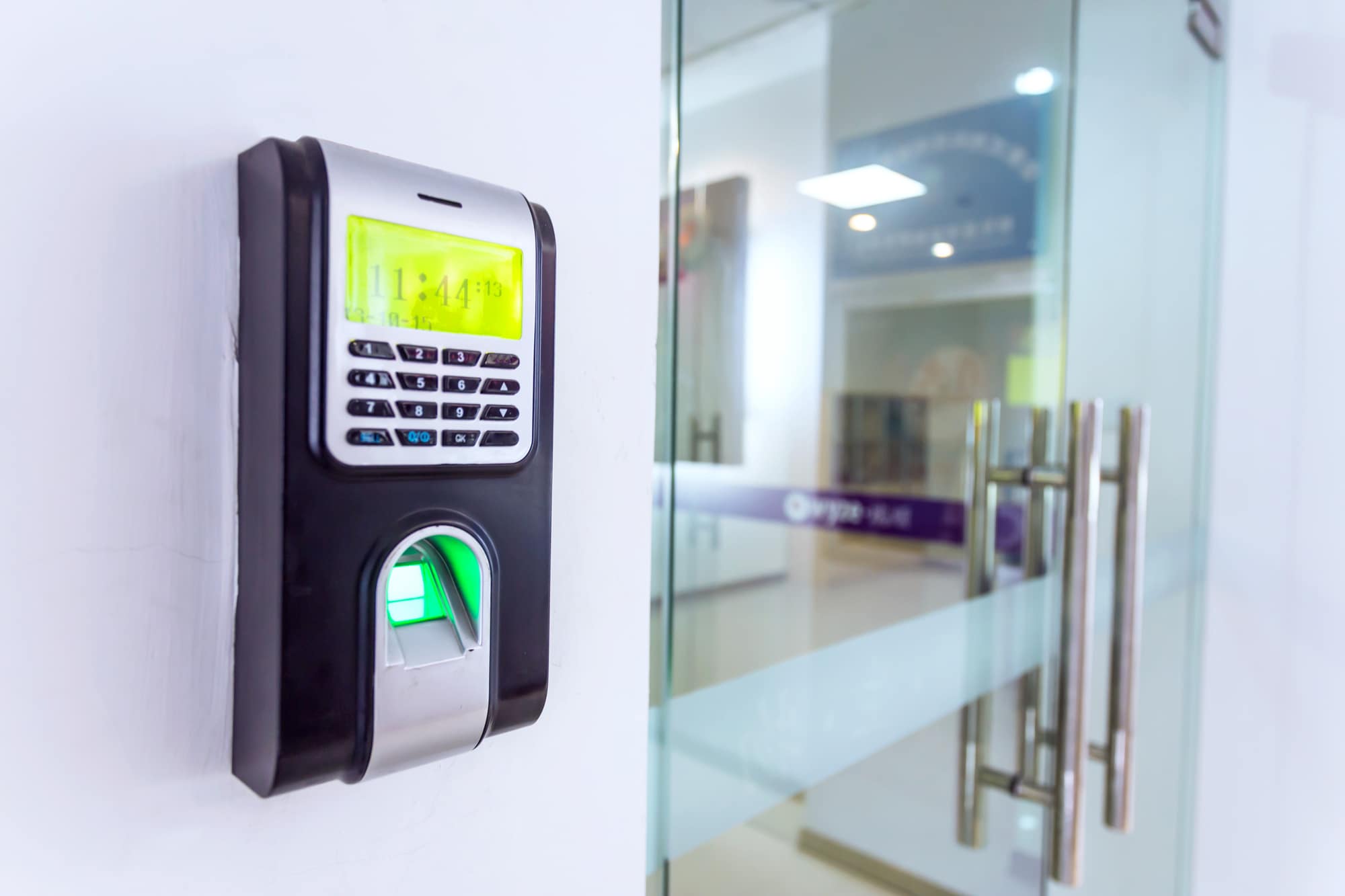
In the ever-evolving landscape of business security, safeguarding your company’s assets, data, and personnel is not just a necessity—it’s a crucial responsibility. Among the myriad of security measures available today, access control systems stand out as a cornerstone for any comprehensive security strategy. These systems are not merely about restricting entry; they’re about managing and monitoring access in a way that seamlessly integrates with the daily operations of your business.
LogicFortress, with its deep roots in Connecticut and a robust understanding of the security challenges faced by modern businesses, recognizes the critical role that access control plays in safeguarding a company’s assets. In this comprehensive guide, we delve into the signs that indicate your business might be in need of a robust access control system. Whether you’re running a bustling corporate office, a retail business, or a high-traffic service provider, understanding these signs is key to enhancing your security measures and protecting what matters most.
Join us as we explore how access control systems not only bolster security but also bring efficiency, compliance, and peace of mind. It’s not just about locking doors; it’s about unlocking the potential for a safer, more secure business environment.
Understanding Access Control
At its core, access control is about managing who can or cannot enter a particular area within your business premises. It’s an integral part of any business’s security plan, ensuring that only authorized personnel have access to sensitive areas, data, or assets. But what exactly comprises an access control system, and how does it function?
Types of Access Control Systems
- Electronic Access Control Systems: These are the most common and include systems that use electronic keys, cards, or fobs for entry. They are convenient, easy to manage, and can be integrated with other security systems.
- Biometric Systems: Utilizing unique physical characteristics such as fingerprints, facial recognition, or iris scans, biometric systems offer a high level of security and are often used in high-security areas.
- Key Card Systems: Often used in hotels and offices, these systems use cards that can be programmed with varying levels of access, allowing for flexibility and ease of use.
Primary Functions of Access Control
- Restriction of Unauthorized Access: The primary function is to keep unauthorized individuals out of restricted areas.
- Monitoring and Recording Access: Modern systems can track who enters and exits, providing valuable data for security and management purposes.
- Integration with Other Security Measures: Access control systems often work in tandem with surveillance cameras, alarms, and other security measures to create a comprehensive security solution.
Understanding these systems is the first step in recognizing their importance and how they can be implemented in your business. With technology constantly evolving, access control systems have become more sophisticated, user-friendly, and integral to the security of businesses across various industries. As we move forward, we’ll explore why these systems are not just a luxury but a necessity for businesses in today’s world.
The Importance of Access Control in Business
Access control systems are more than just a means to lock and unlock doors. They play a pivotal role in enhancing the overall security and efficiency of a business. Let’s explore why implementing an access control system is crucial for modern businesses.
1. Protecting Sensitive Data and Areas
- In an era where data breaches are increasingly common, controlling who has access to sensitive information is vital. Access control systems ensure that only authorized personnel can access areas where sensitive data is stored, significantly reducing the risk of data theft and breaches.
2. Managing Employee Access and Tracking
- With access control systems, businesses can manage and monitor employee access throughout the premises. This not only enhances security but also aids in tracking employee movements, which can be crucial in case of security incidents. Additionally, it helps in managing access rights for employees based on their role and clearance level.
3. Compliance with Legal and Industry Standards
- Many industries have regulations that mandate certain levels of security, including controlled access to specific areas. Failure to comply can result in hefty fines and legal issues. Access control systems help ensure that businesses meet these regulatory requirements, avoiding legal complications and maintaining industry standards.
4. Incident Response and Emergency Protocols
- In the event of an emergency, access control systems can be invaluable. They allow for controlled evacuation and lockdown procedures, helping to secure areas quickly and efficiently. This aspect is crucial for employee safety and safeguarding assets during emergencies.
5. Reducing the Risk of Theft and Vandalism
- By controlling who can access the premises, businesses significantly reduce the risk of theft and vandalism. This protection is not just against external threats but also internal ones, as employees are less likely to commit theft in a well-monitored environment.
The importance of access control in business cannot be overstated. It’s not just a layer of security; it’s a shield that protects the very core of your business – its people, data, and assets. As we delve deeper into the signs that your business might need an access control system, keep these critical roles in mind. They are what make access control an indispensable part of modern business operations.
Key Signs Your Business Needs Access Control

Recognizing when your business requires an access control system is essential for maintaining optimal security and operational efficiency. Here are some key signs that indicate it might be time to consider implementing or upgrading your access control solutions:
1. Increased Need for Security and Monitoring
- If your business has experienced security breaches, theft, or unauthorized access incidents, it’s a clear sign that your current security measures are insufficient. Access control systems provide an enhanced level of security, ensuring that only authorized individuals have access to sensitive areas.
2. Business Expansion and Multiple Access Points
- As your business grows, so does the complexity of managing access. With more employees, visitors, and multiple entry points, a robust access control system becomes crucial to maintain security across your expanding premises.
3. Handling Sensitive Information or Valuable Assets
- Businesses dealing with confidential data, high-value inventory, or critical infrastructure must have strict access control measures in place. Restricted areas containing sensitive information or valuable assets require controlled access to prevent potential breaches or thefts.
4. Compliance with Regulatory Requirements
- Many industries are subject to regulations that mandate secure access to certain areas. If your business falls under such regulations, implementing an access control system is not just a security measure but a compliance necessity.
5. Frequent Visitor Access
- If your business regularly hosts visitors, contractors, or temporary staff, managing their access is crucial. Access control systems allow for temporary access permissions, ensuring visitors can access only what they need without compromising overall security.
6. High Employee Turnover
- Businesses with high employee turnover face the challenge of constantly updating access permissions. An access control system simplifies this process, allowing for quick and easy updates to access rights as personnel changes occur.
By identifying these signs in your business, you can take proactive steps towards enhancing your security infrastructure. An access control system is not just a reactive measure to security threats but a proactive tool to safeguard your business against potential risks.
Benefits of Implementing Access Control
Investing in an access control system brings a multitude of benefits that go beyond traditional security measures. Let’s explore how these systems can positively impact your business:
1. Enhanced Security and Peace of Mind
- The most apparent benefit is the heightened security level. By controlling who can access your premises, you significantly reduce the risk of unauthorized entry, theft, and other security breaches, providing peace of mind for both you and your employees.
2. Streamlining Access and Movement Within the Business
- Access control systems allow for smooth and efficient movement of authorized personnel within your premises. This streamlined access can lead to increased productivity and a better overall working environment.
3. Detailed Access Logs and Monitoring Capabilities
- These systems provide detailed records of who enters and exits your premises and when. This information is invaluable for security auditing, investigating incidents, and understanding traffic patterns within your business.
4. Scalability and Flexibility for Growing Businesses
- As your business grows, your access control system can grow with it. Modern systems are designed to be scalable, allowing you to add more access points or users as needed, ensuring that your security measures keep pace with your business growth.
5. Integration with Other Security Systems
- Access control systems can often be integrated with other security measures, such as surveillance cameras, alarms, and fire safety systems, creating a cohesive and comprehensive security strategy.
6. Reducing Dependency on Physical Keys
- Physical keys can be lost, stolen, or copied, posing a security risk. Electronic access control eliminates this issue, as access rights can be easily revoked or changed without the need to alter physical locks.
7. Customizable Access for Different User Groups
- Access control systems allow for the customization of access rights based on user roles, time of day, and specific areas, ensuring that individuals only have access to the areas necessary for their role.
The implementation of an access control system represents a strategic investment in the security and efficiency of your business. By embracing this technology, you not only protect your assets and personnel but also position your business as forward-thinking and security-conscious.
Choosing the Right System
Selecting the most suitable access control system for your business is a critical decision that depends on various factors. Here’s a guide to help you navigate this choice, ensuring you find a system that aligns perfectly with your business needs:
1. Assessing Your Business Needs
- Start by evaluating the specific security needs of your business. Consider the size of your premises, the number of access points, and the nature of the areas that require protection (e.g., offices, warehouses, server rooms).
2. Understanding Different System Types
- Familiarize yourself with the different types of access control systems available, such as electronic, biometric, and key card systems. Each type offers different features and levels of security, so understanding their functionalities is crucial in making an informed decision.
3. Considering Scalability and Flexibility
- Ensure that the system you choose can scale with your business. It should be flexible enough to accommodate future growth, additional employees, and potential changes in your business layout or security needs.
4. Integration with Other Security Systems
- Look for a system that can integrate seamlessly with your existing security infrastructure, such as CCTV cameras, alarm systems, and fire safety equipment. This integration is key to creating a comprehensive and cohesive security strategy.
5. Budget and Long-Term Costs
- While budget considerations are important, it’s also essential to think about the long-term costs associated with maintaining and upgrading the system. A more cost-effective solution upfront might lead to higher costs in the long run.
6. User Experience and Management
- Consider the user experience for both employees and administrators. The system should be user-friendly and straightforward to manage, with a clear and intuitive interface for monitoring and controlling access.
7. Professional Advice and Installation
- Consulting with security experts like LogicFortress can provide invaluable insights. Professional installation and support ensure that your system is set up correctly and remains effective over time.
By carefully considering these factors, you can choose a system that not only meets your current security needs but also anticipates future challenges. Remember, the right system will enhance not just the security but also the efficiency and operational fluidity of your business.
Final Thoughts
 As we’ve explored in this guide, the decision to implement an access control system in your business is not just about enhancing security — it’s about taking a proactive step towards safeguarding your business’s future. From protecting sensitive data and valuable assets to ensuring compliance with regulatory standards, the importance of effective access control cannot be overstated.
As we’ve explored in this guide, the decision to implement an access control system in your business is not just about enhancing security — it’s about taking a proactive step towards safeguarding your business’s future. From protecting sensitive data and valuable assets to ensuring compliance with regulatory standards, the importance of effective access control cannot be overstated.
Remember, the signs that your business needs access control — such as a growing workforce, management of sensitive information, and regulatory compliance requirements — are not just challenges but opportunities to strengthen the foundation of your security infrastructure. The benefits, including enhanced security, streamlined access, and the integration with other security measures, contribute to a safer, more efficient, and more resilient business environment.
Choosing the right system requires careful consideration of your specific business needs, scalability, budget, and the overall user experience. With the expertise and support of a trusted partner like LogicFortress, you can navigate these considerations to find the perfect fit for your business.
We invite you to take the next step in securing your business. Contact LogicFortress today to discuss how we can tailor a solution that meets your unique business requirements. Together, let’s unlock the potential of a secure, efficient, and forward-thinking business environment.




